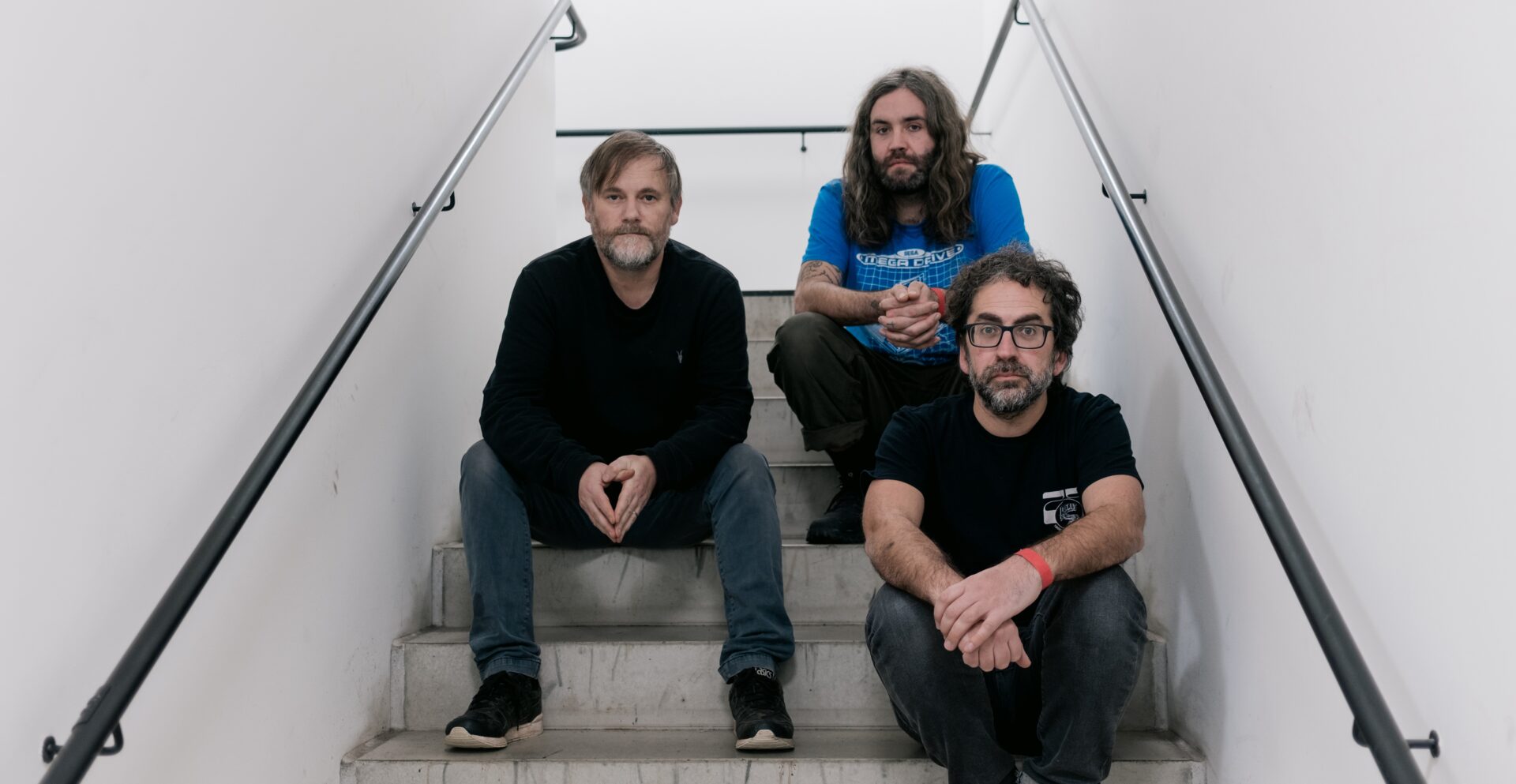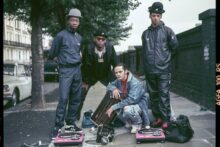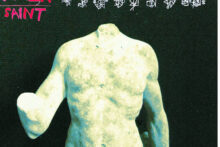“If you’re a Beak> fan,” suggests the band’s bassist Billy Fuller, “to wake up in the morning and go, ‘Fuck me! There’s a new Beak> record! Fucking hell, there’s a tour’ – it’ll just be a nice little bump for everyone that’s into it.”
So here it is. The Bristol trio’s first album in six years, >>>>, arrives today in full – with no advance warning, singles or promotion. Grappling with a warped self-view after years of touring their celebrated third album >>>, the band withdrew to a remote farmhouse in north Wales: aiming to recreate the simple writing approach from their self-titled debut 15 years ago. While that first album was completed in 12 days though, they would continue developing and refining >>>> for two years.
The results are astonishing. >>>> infuses Beak>’s signature mix of motorik psych grooves, gelatinous synths and translucent, disembodied vocals with a new double-character. On one hand, there’s a fresh sense of candour and spontaneity – a rawness can be felt, with snippets of background chatter caught on tape, still audible from their sessions. On the other, owing to the album’s long refinement and use of overdubs, this is headphone music like they’ve never attempted before: full of sudden, surprising shifts in space, texture and structure. Ambiguity is everywhere: sounds that defy placement, half-caught lyrics that feel as if they’re arriving via a system of air vents, and a tone that wavers between sad and euphoric; between earnest and slyly funny.
Surprise-releasing the album goes against conventional wisdom, notes Geoff Barrow: the band’s drummer and vocalist, who also co-runs their label Invada. “What happened with the industry after Covid was, ‘We need to sell the album upfront to get it into shops, and this is the way it has to be, and it has to be on a Friday,’” he says. “Fuck off! We run our own label, you can’t tell us what to do!”
“It was flagged to us that if people want the vinyl, they’ll have to wait until three days after it’s released,” notes synth-player Will Young. “Well, that’ll be three days after they’ve heard it, whereas if we’d done it the other way around, they’d have waited 14 weeks. I don’t see how that’s weird or a problem,” he shrugs. “Industry innovators, we are!”
The album opens with ‘Strawberry Line’: an eight-minute tribute to Barrow’s dog Alfie, shown on the cover firing laser beams from his eyes across Bristol’s Clifton Suspension Bridge, like a particularly lovely version of the Kaijū Gigan. This instrumental track was recorded during Beak>’s sessions in the Welsh farmhouse. “We took all the furniture out the living room, put it up against the walls, and set up for a whole week with all our gear,” says Fuller. “It was just us and an engineer – a mate of ours who was making black bean burritos every day. Just us and about a thousand sheep outside.”
The following year, Alfie passed away. “It seemed like a fitting tribute to have him on the album cover, and this track,” says Barrow. “He’d been involved in the band since the very beginning.”
“He’s the ‘Eggdog’ isn’t he?” Young asks, referring to a song of that name from their second album, 2012’s >>.
“We just reversed the words ‘dog egg,’ because while we were recording ‘Eggdog’ Alfie went under the control desk and took a huge shit,” nods Fuller. “But also, Alfie’s on the back cover of >>>. He’s stood between my legs where we’ve got the white suits on, along with Geoff’s other dog Nellie, so he’s always been around.” With the addition of Barrow’s vocals, ‘Strawberry Line’ is simple but affecting. Long sustained organ notes accompany his playful, touching tribute to Alfie: “Time is short, and so is he.” Live drums slowly fade in, punctuated by deep synth stabs, driving towards a crescendo of harmonised vocals and rising arpeggiated synths. “Take your bone, sit down, fall asleep,” Barrow bids his departed furry friend, before addressing the listener: “so we begin.”
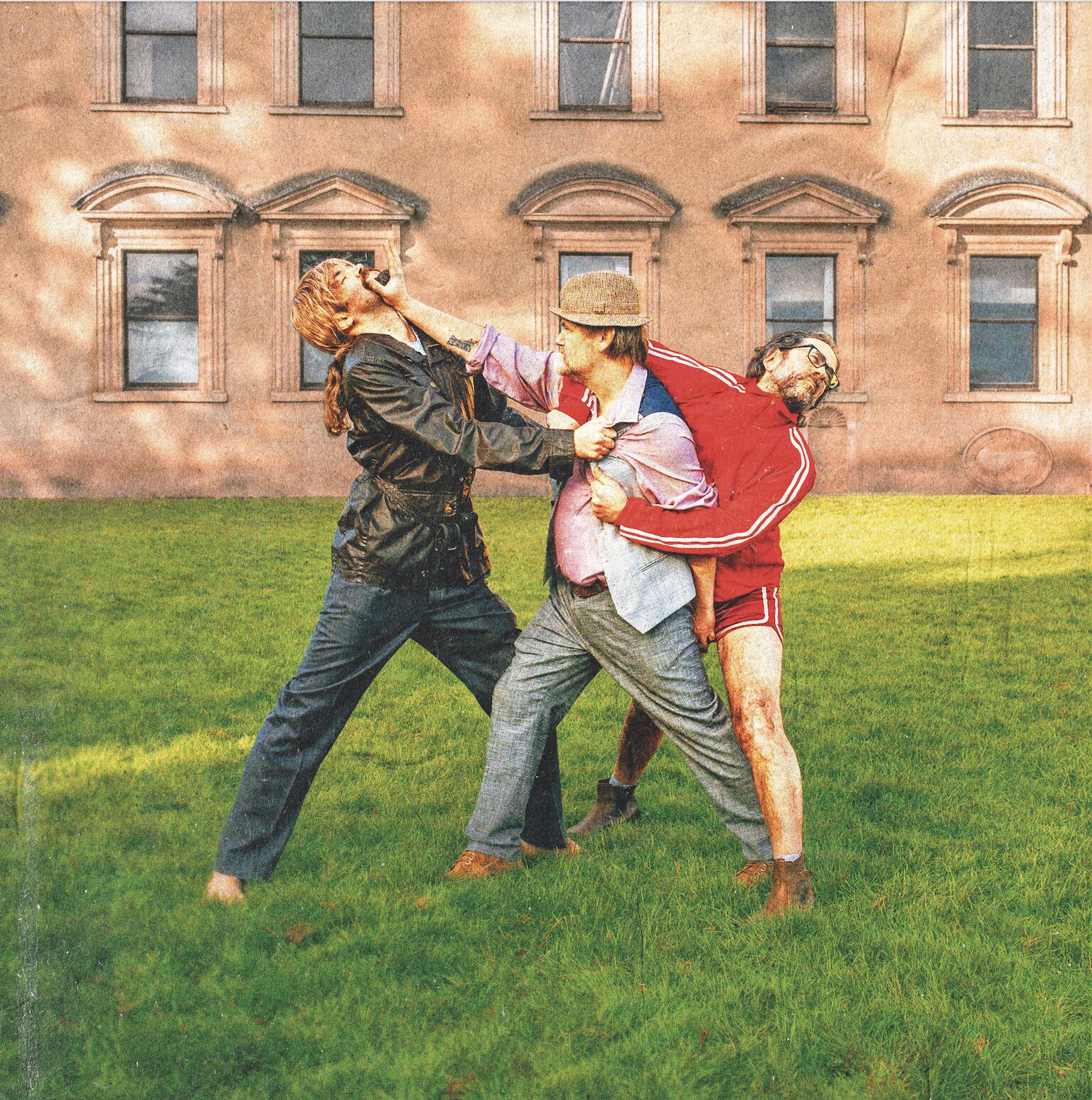
This stint in the countryside came after years of touring their well-received 2018 album >>>. “We were playing big-ish European festivals to people that didn’t know us,” says Young, explaining the desire to animate those crowds began to creep into their writing. “We ended up rock music-ing it up,” he says. “We realised, ‘keep this up and we’re just going to sound like a really bad Foo Fighters.’”
While these focused sessions marked a return to how Fuller and Barrow wrote Beak> (Young would join the band later, replacing co-founder Matthew Loveridge aka MxLx), Fuller notes that things were bound to be different this time. “When we first started, we didn’t even know each other. We started playing together, and didn’t really chat about anything,” he says. “You can never truly get back to that, because we know each other.”
Did revisiting this way of writing, after 15 years, stir any unexpected feelings in the band? “It’s not allowed!” Fuller laughs. “We’d just take the piss out of each other if that happened: ‘I want to chat about the football in a minute, shut up!’” At any rate, the band’s constant efforts to avoid conventional songwriting ideas seems to leave little energy spare for sentiment. “I’ve been in the band for 15 years, and it still doesn’t come naturally for me to write for Beak>,” says Fuller. “I bring a lot of stuff to the table, but I don’t pick up my bass and bang, there’s another Beak> tune. It’s fucking hard!”
“We prefer to die trying to write interesting music, even if it fails” Barrow agrees. As for sentiment: “We’re a very normal weirdo band. It doesn’t mean we don’t feel stuff – we rely on playing together to make those emotional things happen, rather than talking about them.”
In this spirit, it is the performances and production choices on >>>> that reveal more of the band than previous albums. There is a more candid, spontaneous feel to things: the end of ‘Denim’ leaves in a clip of Barrow telling the band he has to take the dogs out. ‘Secrets’ opens with another snippet of chatter over a drum machine: the erratic tweaks to its cut-off and echo suggesting this is not a rehearsed part, but one of many exploratory first takes on this album that made the cut.
“I’m a firm believer that if people can hear a song, it doesn’t need to be made into a top-quality recording,” Barrow says. “If we listen to jazz from the 1920s, it’s rough as fuck – but that stuff has an atmosphere, and to get rid of that’s a real shame.” So, those elements of noodling and chatter stayed. “People who like music like Beak> don’t need it sanitised.”
“It’s good for the listener to be reminded it was a moment in time that got captured,” Young adds. “If a drum take has a good vibe and sounds good, and you can hear people arguing about tea over the top, it doesn’t really matter – we’ll keep that.”
Barrow agrees. “We’re not fucking Imagine Dragons are we?”
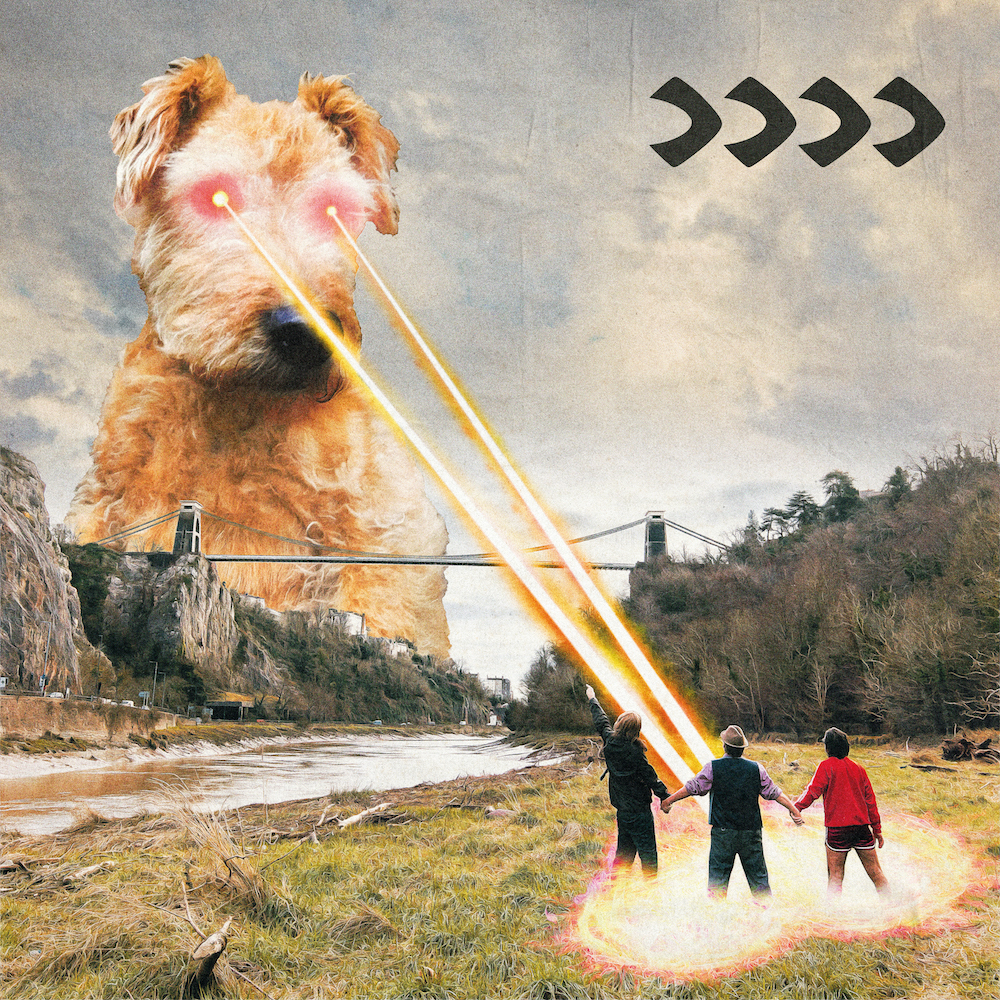
Beyond those fragments, this is an album full of little sonic eccentricities and surprises. ‘The Seal’ closes on a synth loop deep in the left headphone: its metallic burbling suddenly intensifies, like a startled robot, and it lurches forward to fill both headphones. It then vanishes, before reappearing as a ghost of itself in the background of ‘Windmill Hill’. “Usually, for me, mixing Beak> albums is more firefighting than being creative,” Barrow grins. “You’re trying to get rid of this noise that’s over every microphone. Some of it’s on purpose – I play around with stereo fields and things. But when a synth or guitar goes mental and you pull it down, but then it reappears in the overhead channel of the kit, suddenly it’s back over there,” he says. “When we realised this record wasn’t going to be The Best Of Foreigner, we settled into that.”
This all contributes to Beak>’s most texturally alive album: constantly playing with density, saturation and space. The distant, viscid synths on ‘Bloody Miles’ trade off, via a dramatic synthetic swell, to a bass and drum groove that sounds like it’s being played a few feet away. This effect is created partially during the overdubbing stage, a process they had barely considered on previous albums. “We’ll overdub a big riff at the end of something, and it’s like: ‘Wow, that’s just fucking smashed in there,” Young says. “We’ll decide, ‘Yeah it’s cool, leave it,’ rather than, ‘Let’s try to blend it all into something that sounds alright on DAB radio.’”
One of the most striking textural moments is where Fuller’s lithe bass joins the brittle electronic drums on ‘Secrets’: the only recording, aside from ‘Strawberry Line’, to have survived from the stint in Wales. With its disco-inflected bassline and drum machine, it is at once an album outlier, a highlight, and a point of controversy in the band. “Me and Will really like ‘Secrets’, but there’s somebody here that fucking hates it,” Fuller says, gesturing to Barrow. “The compromise was that ‘Secrets’ is on the digital version and CD, but not the vinyl – because we also had to compromise on length. So, in Geoff’s head it’s not on the album.”
“I’ve got no idea what track you’re talking about,” Barrow smiles.
One of the joys of >>>> is its use of sounds that are not immediately easy to identify. The entry of a strange, heavily flanged sound towards the end of ‘Denim’ gradually reveals itself to be a heavily manipulated guitar: briefly suggesting itself as the source of those eerily similar-sounding synth chords – reminiscent of Gary Numan’s ‘Complex’ – which open the track. “When you hear a record and you don’t know what that sound is, it’s really exciting,” Barrow says. “It’s part of the reason you get into sound production in the first place.”
This ambiguity colours not just the album’s sounds, but its overall atmosphere. A strange melancholy hangs over >>>>, vacillating between angst – particularly on the direct, densely percussive ‘Ah Yeh’ – and yearning, as in the gorgeous vocal harmonies on the standout ‘Hungry Are We’. Dark, twisted sounds are everywhere, like the grating synth lingering throughout ‘The Seal’, but in the context of melodic, chord-driven writing. “It’s like if the people that made Jesus Christ Superstar had depression,” summarises Barrow.
“We are quite sad people a lot of the time,” says Young, “but we do also enjoy playing music with each other, so you get that funny juxtaposition: sad people making sad music, but having a really good time.”

‘Windmill Hill’ upholds a longstanding Beak> tradition of naming songs after places around the West Country. ‘Iron Acton’ on Beak> took its title from a small Gloucestershire village, while a Somerset promontory was immortalised in >>>’s lead single ‘Brean Down.’ “When we started out, we just thought it’d be a really cool thing to name songs after places we’d grown up with,” says Fuller. “Windmill Hill is just around the corner from Invada studios, and for about 200 years there’s always been a pub on that hill. Very recently, they couldn’t afford to run it anymore – it closed down, was turned into residential flats, and another hub of the community’s gone,” he explains. “It really pissed me off, because that’s happening everywhere in the UK it seems. Obviously there’s a need for housing, but there isn’t any sense of community – there’s nothing, so everybody just stays in their houses.”
“We’re seeing a lot of gentrification all over the country, but especially in the south west – it’s kind of out of control,” Barrow adds. “You do feel like there’s a lot of older people, and people who traditionally lived in these areas, who are just not being catered for. There’s a huge amount of people moving from London, and I don’t blame them, but there’s a systematic shrinking of Bristol’s vibe. What you’re getting is a made-up version of it: ‘Here’s some graffiti.’” Barrow is more positive in his outlook on the new experimental music coming through the city. “A lot of young kids are pushing forward, which has been so nice compared to experiencing years and years of bands trying to sound like Oasis.”
Beyond Bristol, unimaginable change has taken place in the music industry since Beak>’s debut album 15 years ago: Beak> arrived, notably, just one year after a plucky new app called Spotify first fired up in the UK. Even since >>>’s release in 2018, discussions have moved between touring difficulties around Brexit, the lockdowns, and most recently the rise of AI. “Beak> has always been slightly outside of the industry,” says Barrow. “We’ve been very lucky to have Invada – we can do what we want.”
Even with the freedom the label gives them, Beak> have still found the last six years challenging. “We were one of the first bands to go back out once Brexit kicked in hard, and we were just met with utter chaos,” says Fuller. This centred on confusion between international authorities on how the new order worked, particularly the ATA Carnet system: essentially an instruments passport listing the items and weights of their gear, which needed to be approved and stamped by border officials. The time this process could take was unpredictable, which meant travelling to borders earlier, which in turn increased costs like van and crew hire. While the system has since changed, aiming to reduce these issues, it hit Beak> hard. “Since Brexit, it’s costing us a third more just to be out there.”
Whatever challenges it poses, Beak> will be embarking on their biggest tour to date later this year, on which they intend to play >>>> in full. “We’re bound to play ‘Wulfstan II’ at the end,” Barrow caveats. “We’re not going to go Neil Young, and not play anything you’ve heard before – we just think it’s an interesting thing to do. When we played our first shows, we played a café in France, and that was just odd music.”
“We didn’t even have any of our own gear,” Fuller adds. “We borrowed it all.”
“This is going back to that a bit – just setting up a vibe, and not worrying about people jumping up and down,” Barrow says. “I’ve always liked the idea of being in a band that does that, but for some reason I’ve never been in one that does.”
It is easy to see how this album’s dramatic character and pacing will lend itself to that setting: from the long, gradual build of ‘Strawberry Line’ to the motorik, rock-inflected outro on closing track ‘Cellophane.’ It is also the most conventionally beautiful Beak> album. However, after two years of working on it, and without any singles with which to gauge the fans’ response, Beak> are still in the dark about how this will go down. “Because we haven’t had any build-up, you’re only the second person after my wife who has told me they like it,” Fuller tells me.
“And she’s lying anyway!” Barrow chips in.
“So there is this level of uncertainty. Ultimately, I just hope there’ll be something there for Beak> fans to enjoy,” he says. “And we’ll see them at a gig.”
Beak> tour Britain and Europe this Autumn and Winter. >>>> is released today by Invada and Temporary Residence LTD

